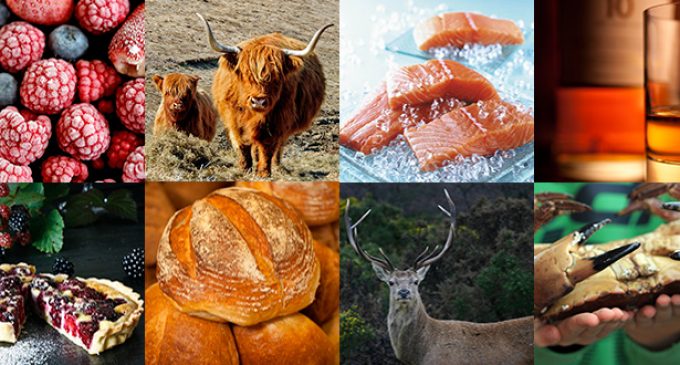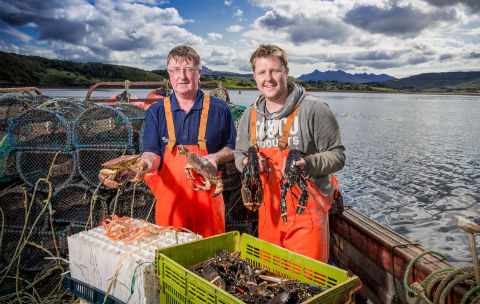Scotland Food & Drink Chief Blasts Brexit Risk to Industry

As the UK Government sets out its opening negotiating position for future trading relationships, James Withers, CEO of Scotland Food & Drink, raises the industry’s concerns over the current direction of travel. The Scottish food and drink sector is now worth £15 billion to the Scottish economy, with exporting a crucial pillar supporting growth. Ensuring a seamless trading relationship with the UK’s biggest single export market, the European Union, is vital for the ongoing success of the industry, according to Withers.
Speaking ahead of a Brexit Breakfast event in Edinburgh hosted by law firm, CMS, he said: “Looking back at the mess over the last three years since the EU referendum, it is easy to forget that securing a withdrawal agreement was supposed to be the easy part of leaving the EU.
“The tough bit is securing a long-term trade deal. So, it’s taken three years to do the easy bit and we now have 11 months for the really tough bit. Though in reality, the timetable is even harsher than that: the process of securing any extension of the transition period beyond the end of 2020 would need to start in the summer to make its way through the EU decision-making process by the end of the year.
“That means we have little over 20 weeks to frame a trade deal with the EU. In other words, we’re in search of a miracle. The spectre of a no deal Brexit has haunted Scotland’s farming, food and drink industry since 2016. It feels like the very thing we feared and have been told has been avoided may now be facing us at the end of the 2020.
 “Even if a deal can be struck, initial positioning from the UK Government is hardly reassuring for Scotland’s largest manufacturing sector. The consequence of the UK Government’s strategic shift away from alignment with EU regulation serves to kill off any hope of achieving frictionless trade, or anything close to it.
“Even if a deal can be struck, initial positioning from the UK Government is hardly reassuring for Scotland’s largest manufacturing sector. The consequence of the UK Government’s strategic shift away from alignment with EU regulation serves to kill off any hope of achieving frictionless trade, or anything close to it.
“In recent days, there has been some welcome rowing back on the Chancellor’s comments which seemed to rule out alignment. Trying to flex the UK’s new trading muscles may go down well with some audiences at home, but it risks becoming detached from the reality of trying to maintain a critical trading relationship with our partners on the continent.
“Costly new checks and processes – and potentially tariffs on some of our food products – will act as a major new barrier to trade with our biggest single export market. Scotland sold £2 billion of food and drink to the EU last year, and with ingredient imports flowing the other way, the implications of barriers to trade cannot be overestimated.
“Frictionless trade is particularly important for Scotland’s unrivalled stock of perishable produce, where time is of the essence. Around 7.5% of Scottish red meat sales are to customers in the EU. That may seem like a small percentage, but for Scotch lamb, exports to the EU equate to a quarter of all sales, underpinning Scotland’s fragile sheep sector.
“Tariffs anywhere close to WTO levels could increase the price of our products in the EU market by more than 50%. While seafood doesn’t face the same scale of tariff threat, additional bureaucratic costs and the associated risk of delays is a real concern.”
James Withers does, however, see a silver lining to what looks like a very dark cloud, adding: “To strike a positive note though, new country trade agreements may open up alternative market opportunities beyond the EU. The Scotland Food & Drink Export Partnership – a government and industry project which is driving exports from Scotland – is assessing these opportunities and developing a plan to harness them.
“The work of one partner, Quality Meat Scotland, to develop red meat export markets beyond the EU has never been more important. The Canadian, US, Japanese and Chinese markets are all opening up.
“While they won’t compensate for the loss of free trade with the EU any time soon, it is an area that could significantly strengthen Scotland’s global culinary reach. International sales remain a transformational opportunity for Scotland’s food and drink businesses. Of course, new trade deals pose risks too. Chlorinated chicken might be an over-used example, but the risks of lowering our standards for food imports are serious and not a price worth paying for securing some trade wins for other sectors of the economy.”
“It’s imperative that we do not engage in a global race to the bottom in the standards and protections we set for what we eat and drink. Scotland’s food and drink sector has been forging a reputation for premium food and drink for decades and we should be setting the gold standard for animal welfare, environmental protection and food safety.”
It’s not only the produce and the finances that Scotland Food & Drink’s CEO is concerned for, but the tens of thousands of people who make the industry truly world leading.
He continued: “One third of the current labour force across Scotland’s food and drink sector comes from other European Union countries. That equates to almost 40,000 talented workers, making an invaluable contribution from the factory floor through to the boardroom.
“Free movement of labour between the UK and EU is sadly ending. For a country like Scotland, where people are a scarce and valuable resource, we need a new system that enables immigration and doesn’t treat it as an inherent problem.
“As an industry, we are going to have to push hard to ensure that our new trade negotiators understand the imperative of avoiding a relationship with the EU characterised by friction. Much of the last three years has been marked by heated, political rhetoric and bluster at the expense of logic and a reasoned examination of the impact of the choices we are about to make.”

































